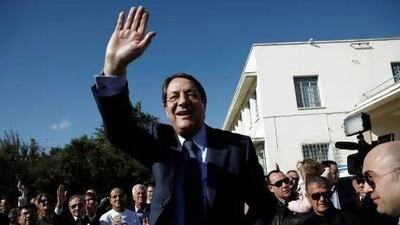NICOSIA // Nicos Anastasiades, committed to finalising a multibillion-euro bailout with international lenders to resolve crisis-hit Cyprus, came out ahead in presidential elections last night but without the outright majority needed to avoid a run-off vote. Car horns blared in celebration across Nicosia, the island's divided capital, as exit polls gave the leader of the centre-right Democratic Rally party 45 per cent of the vote. It was ahead of main challenger Stavros Malas, 45, a British-educated independent backed by the AKEL communist party who won 27 per cent, but short of the 50 per cent plus one vote of the ballots cast to avoid a run-off on Sunday.
"It shows Cypriots wanted to turn over a new leaf. The majority of voters clearly recognised the urgency of the need to end the uncertainty that has dragged on for far too long," Kyriacos Iacovides, the publisher of the Cyprus Mail newspaper said.
There will be no honeymoon period for the new leader, as Cyprus may run out of money by April. Mr Anastasiades, 66, has promised a quick agreement with the European Union and the International Monetary Fund to secure a bailout if he becomes president.
"It is the survival of our country which is at stake," he said after voting yesterday.
Cyprus sought financial help last year when its outsize banking sector suffered huge losses from Greece's sovereign debt restructuring. The island needs about €17 billion (Dh83bn) in aid - an amount almost equal to its entire annual economic output. Even though it accounts for just 0.2 per cent of the EU's GDP, the country's debt and banking woes could - unless contained - threaten progress made in shoring up the rest of the euro zone's periphery.
The crisis has hit Cypriots hard and suddenly after years of proud prosperity during which many families owned two cars, employed foreign maids and holidayed in increasingly exotic locations. Now unemployment stands at a record 15 per cent while those with jobs are suffering sharp salary cuts.
Many Cypriots blame the debacle on their hapless current president, Demetris Christofias, the EU's only communist leader. He is standing down with rock-bottom approval ratings, the first president in Cypriot history not to seek a second five-year term.
"We had a booming economy but it has crashed to a halt," said Sandro Dikaios, an accountant in Nicosia said yesterday. "Shops and family businesses are closing down every day while the lines of unemployed are growing. And Christofias simply doesn't know what to do about it."
Mr Anastasiades has a reputation as a political bruiser with a hot temper but good sense of humour and sharp intellect. Diplomats view him as a realist and pragmatist.
"Right now Cypriots want strong leadership and Anastasiades fits the bill," said James Ker-Lindsay, a Cyprus expert at the London School of Economics.
Hubert Faustmann, a political analyst at the University of Nicosia, described Mr Anastasiades as "a respected politician, if not a particularly popular one. But he's the best choice for Cyprus."
Mr Christofias reluctantly applied for a bailout last June. But he dithered during prolonged negotiations and rejected calls to privatise profitable state-owned companies whose sale is deemed necessary to make Cyprus's debt sustainable.
He blamed Cyprus's economic woes on the failings of global capitalism and risky behaviour by the island's banks. Mr Anastasiades prides himself on his good relations with Europe.
"It will make a big difference to Europe to feel at last they have a trustworthy and honest broker as president in Cyprus," Mr Iacovides said.
During a visit to Cyprus last month Angela Merkel, the German chancellor, backed Mr Anastasiades' candidacy and her support could help with another urgent issue.
Some German opposition politicians claim a Cyprus bailout would mostly benefit Russian oligarchs alleged to have laundered ill-gotten billions in Cyprus - a charge it vigorously denies.
Cyprus's new president will also have to decide how best to capitalise on huge offshore gas finds discovered in 2011. They will take several years to monetise but hold the prospect of future riches for the debt-struck island.
Turkey has challenged the Greek Cypriots' right to drill while Cyprus remains divided, arguing that the Turkish Cypriots, whose self-declared state is recognised only by Ankara, would lose out on the hydrocarbon bonanza.
Cyprus, represented internationally by the Greek Cypriots, was split in 1974 when Turkey invaded the north following a short-lived Greek Cypriot coup engineered by the junta then ruling Greece.
mtheodoulou@thenational.ae

